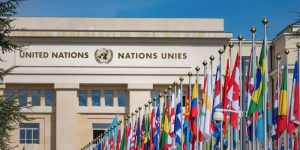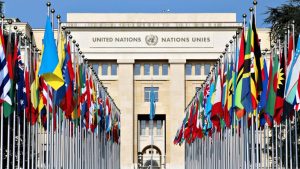The Incompetence of the United Nations: The founding of the United Nations in 1945 was a profound act of hope born from the ashes of two world wars. Its Charter’s very first words pledged “to save succeeding generations from the scourge of war” and “to reaffirm faith in fundamental human rights.” For decades, this institution has served as the symbolic heart of a rules-based international order, a forum for dialogue, and a purported guardian of global peace.
The Incompetence of the United Nations: The Veto as a Tool of Paralysis
Yet, from the killing fields of Rwanda and Srebrenica in the 1990s to the contemporary slaughter in Gaza, a persistent and damning question echoes across the globe:
Why is the UN powerless to protect the very people it was created to serve? The stark reality is that the organization is often hamstrung by its own architecture and the cynical geopolitics of its most powerful members.
This systemic failure is not merely a occasional stumble; it is a chronic condition.
This article will argue that the core issue is a deep-seated incompetence of the United Nations, a paralysis engineered by the veto power of the Permanent Five (P5) members of the Security Council, which renders the body incapable of acting against the interests of its most influential states.
This fundamental flaw, coupled with a glaring double standard in the application of international law, has eroded the UN’s credibility and exposed the grim truth that in our current global system, power often trumps principle.
The most critical structural flaw crippling the UN is the anachronistic veto power granted to the five victors of World War II: the United States, Russia, China, France, and the United Kingdom.
Envisioned as a mechanism to ensure great power unanimity and prevent another catastrophic global conflict, the veto has instead become the primary instrument of the incompetence of the United Nations.
The UN Security Council (UNSC) is the only body whose resolutions are legally binding on all member states. It is empowered to authorize military action, impose sanctions, and mandate peacekeeping operations.
However, any substantive action can be unilaterally blocked by a single negative vote from a P5 member. This system places the national interests of five countries above the collective security of the entire world.
Nowhere is this more evident than in the context of Israel-Palestine. Since 1945, the United States has used its veto power over 45 times to shield Israel from critical resolutions, accounting for nearly half of all its vetoes.
This has included blocking resolutions condemning illegal settlements, calling for ceasefires during devastating military assaults, and mandating independent investigations into potential war crimes.
This unwavering protection has effectively granted Israel a state of impunity, sending a clear message that its actions are beyond meaningful international reproach.
This is not a mere oversight; it is the deliberate and systematic application of a rule that guarantees the incompetence of the United Nations in holding a key ally accountable.
Geopolitics and Hypocrisy: The Double Standard of International Law
The application of international law is not blind; it is profoundly political. The selective outrage and inconsistent enforcement of UN resolutions have created a crisis of legitimacy for the entire international system.
This double standard is a powerful driver of the perceived incompetence of the United Nations.
The contrast in the international response to different conflicts is stark and revealing. Following Russia’s invasion of Ukraine in 2022, the Western-led international movement was swift and decisive.
The UN General Assembly passed resolutions demanding Russia’s immediate withdrawal. The United States and Europe imposed crippling economic sanctions and mobilized massive military aid for Ukraine.
The International Criminal Court (ICC) issued arrest warrants for Russian officials.
Conversely, for decades, numerous UN Security Council resolutions demanding Israel end its occupation of Palestinian territories have been rendered meaningless by the American veto.
While the International Court of Justice (ICJ) is currently hearing a case on Israel’s policies in the occupied territories and has issued provisional measures ordering Israel to prevent acts of genocide in Gaza, the lack of a binding, enforced ceasefire from the UNSC renders these legal processes seem toothless.
This hypocrisy is not lost on the Global South, which views the West’s “rules-based order” as a system enforced against its adversaries and ignored for its allies.
This perceived two-tiered system is a testament to the political incompetence of the United Nations as a fair arbiter of justice.
Case Study: Gaza and the Crisis of Conscience
The ongoing war in Gaza stands as the most recent and brutal indictment of the UN’s failure. The scale of destruction—over 37,000 killed, a man-made famine, and the wholesale razing of civilian infrastructure—has been met with a paralyzed international response.
Within the UN, a schism has emerged that highlights its impotence. The General Assembly, where each of the 193 member states has one vote, has passed multiple resolutions with overwhelming majorities demanding an immediate humanitarian ceasefire.
These resolutions reflect the will of the vast majority of humanity. However, General Assembly resolutions are non-binding; they carry political weight but no legal force.
The only body that can enact legally binding measures is the Security Council, where the will of the global majority is consistently vetoed.
After several failed attempts, the UNSC finally passed a ceasefire resolution in March 2024—but only after the United States abstained rather than using its veto.
Even then, the resolution lacked any enforcement mechanism, and the fighting continued unabated. This episode perfectly encapsulates the incompetence of the United Nations:
a delayed, diluted, and unenforced decision that does nothing to stop the killing on the ground.
The world’s premier peacekeeping body is reduced to issuing statements that are promptly ignored because its structure prevents it from wielding real power.
Beyond the Security Council: The Limitations of Other Organs
The failure is not confined to the Security Council. Other UN bodies are also constrained.
-
The General Assembly: While it can express global opinion, its resolutions are essentially recommendations. Its power is moral, not legal.
-
The International Court of Justice (ICJ): The ICJ can issue rulings and provisional measures, as it has done in the case South Africa brought against Israel. However, it has no independent enforcement arm. Compliance relies on the goodwill of states and the backing of the UNSC—which, as we have seen, is often not forthcoming.
-
The International Criminal Court (ICC): The ICC can investigate and indict individuals for war crimes, crimes against humanity, and genocide. However, it faces immense political pressure, and major powers like the US, Russia, and China do not recognize its jurisdiction. Its investigations are slow, and powerful actors often operate with a perceived sense of immunity.
The sum of these parts is a system rich with statutes and courts but poor in enforcement and political will, leading to a pervasive sense of incompetence of the United Nations.
The Silence of World Leaders: Complicity in a Broken System
Why have global leaders, particularly in the West, remained largely silent or offered only tepid criticism while a genocide unfolds in real time? The answer lies in a combination of domestic politics, strategic interests, and outright complicity.
-
Strategic Alliance: For the United States and several European powers, Israel is viewed as a critical strategic ally in a volatile region. This partnership, intertwined with arms deals, intelligence sharing, and shared geopolitical objectives, creates a powerful incentive to avoid any action that would fundamentally pressure the Israeli government.
-
Domestic Politics: In countries like the US, powerful lobbying groups and political constituencies exert significant influence over foreign policy, making criticism of Israel a potential third rail in domestic politics.
-
A Shared Colonial Legacy: Some analysts argue that Western support for Israel is rooted in a desire to maintain a Western-aligned outpost in the Middle East, a vestige of a colonial mindset that disregards the rights and lives of the native Palestinian population.
This silence is not passive; it is an active choice. By refusing to use their considerable leverage—through arms embargoes, sanctions, and diplomatic isolation—these leaders are not merely observing the incompetence of the United Nations; they are its chief architects and enforcers.
Can the Unfit Be Reformed?
The evidence is overwhelming: the United Nations, in its current form, is structurally incapable of fulfilling its primary mandate to maintain international peace and security.
Its incompetence of the United Nations is a designed feature, not a bug. It is a mirror reflecting the brutal realities of global power dynamics, where the interests of a few permanently override the rights of the many.
The path forward is not to abandon the UN—as flawed as it is, it remains the only universal forum for dialogue—but to radically reform it. This would require:
-
Abolishing or Limiting the Veto: The most crucial step. This could involve banning its use in cases of mass atrocities or genocide.
-
Expanding the Security Council: Adding permanent members from Africa, Latin America, and Asia to make it more representative of the 21st-century world, not the post-WWII order.
-
Empowering the General Assembly: Exploring mechanisms to give effect to its resolutions when the Security Council is deadlocked.
Until such reforms are undertaken, the world must understand that the UN’s failure is our collective political failure.
The organization’s incompetence of the United Nations is a symptom of a world order that prioritizes power over people, and interests over justice.
The screams of the victims in Gaza are not just a condemnation of their attackers; they are a damning indictment of a global system that has chosen, once again, to look away.
SOURCE: raialkhalij


